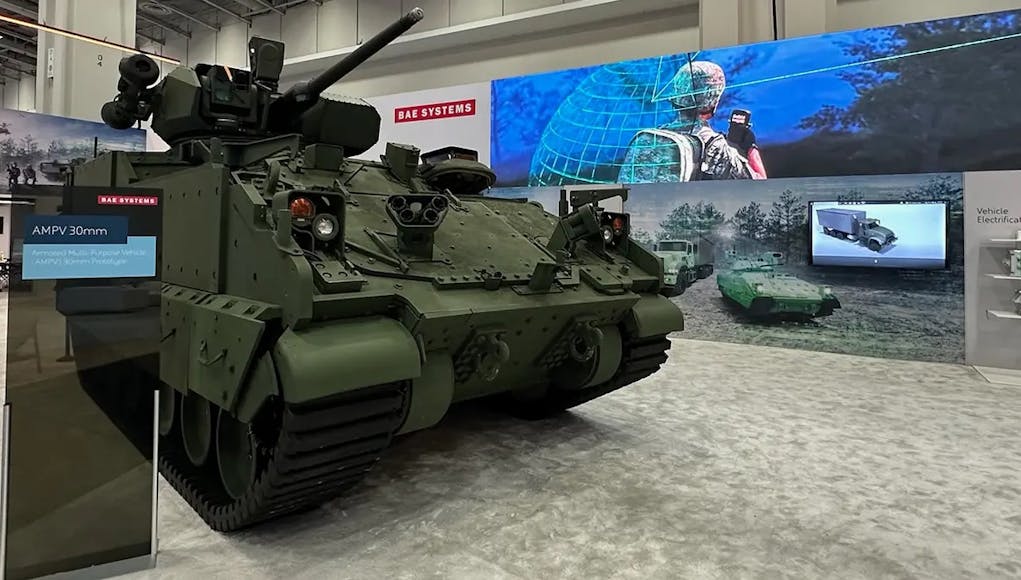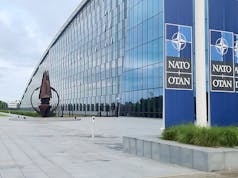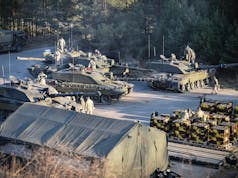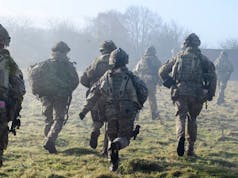BAE Systems showcased two new Armored Multi-Purpose Vehicle (AMPV) prototypes at the Association of the United States Army (AUSA) 2024 annual meeting.
The latest prototypes, say BAE, demonstrate the flexibility of the AMPV platform, which continues to evolve to meet the needs of the U.S. Army.
One of the featured prototypes includes a 30mm turret equipped with the KONGSBERG Medium Caliber Turret (MCT), a lightweight, remote-controlled system that has also been selected for the U.S. Marine Corps’ Amphibious Combat Vehicle program.
The second prototype, known as the AMPV Modular Turreted Mortar System (MTMS), is outfitted with a 120mm remote-controlled mortar system and has recently completed field evaluations at the U.S. Army’s Yuma Test Center. This prototype was delivered to the U.S. Army in early 2024 and was successfully demonstrated during a live fire event at the Maneuver Warfighter Conference in Georgia last month.
A key feature of the AMPV’s adaptability, according to BAE, is its common top plate, which allows for seamless integration of mission equipment, supporting more than 30 different turret systems.
Bill Sheehy, AMPV program director at BAE Systems, said, “Our goal with the AMPV common top plate has remained the same since day one. We are demonstrating the time and cost-effective options the AMPV brings to the table for Soldiers who need new and evolving capabilities quickly so they are ready for today’s battlefields.” The modular design also enables future upgrades, ensuring the vehicle remains adaptable for decades to come.
In addition to the two prototypes on display, BAE Systems has developed three other AMPV configurations over the past year, including a Counter-Unmanned Aerial System (C-UAS) turret, an unmanned 30mm turret, and another medium-caliber 30mm weapon system. All of these adaptations are made possible by the AMPV’s modular design.














So the US Army wants a cheap replacement for the M113 and have gone for a turret less version of the Bradley, now they are sticking loads of different turrets on it.
Does that make sense to anyone ?
Ironic that the Bradley entered service in 1981 and Warior in 1987 and we are replacing our IFV with wheeled.
Hopefully sense will prevail with the IFV. Not all tracked or all wheeled. Horses for courses and some decent armament up top. Simples isn’t it? Same with the SPGs. Going all wheeled with the RCH155. Is that sensible? I think the French are doing the same so that makes two in the club.
BAE were not down selected for the XM-30 Bradley replacement. Might they be keeping a foot in the door based on different US programs of record in case something goes wrong with XM-30?
It’s ironic that the western world’s largest maker of armoured vehicles is a British company and we buy all ours from US and German defence contractors at eye watering prices.
These are built in the US, aren’t they?
Parts of BAE are more American than British.
Yes BAE bought a lot os industries. Bofors in Sweden, for the US United Defence this came with M113, Bradley, M109 155mm SP, the 5″ american naval gun
Interesting, not cognizant of all previous history, but strongly suspect BAES royally torqued off the wrong individuals w/in the MoD at some point. This could explain some of the aversion to BAES products by the British Army. 🤔
The clue is the name…
BAE
BIG And Expensive.
As a shipbuilder they ripped us off, other systems as well; the irony is the CV90 would have been great for us and a lot cheaper.
I had not heard that ‘BIG and Expensive’ dig before. As you say, that has not been especially true for Land equipment made by BAE.
The suspicion is that BAES torqued off the RAF and politicians in Government over the Nimrod AEW3 project in the 1980s. Some (unfairly in my view) solely criticised BAES over the Nimrod MRA.4 MPA programme, cancelled in the 2010 SDSR, at which point it was £789 million over-budget and over nine years late.
The British Army, on the other hand, has had almost all of its AFVs supplied over 60 or more years by 5 British manufacturers: Alvis, RO plc, Vickers Defence Systems, VSEL and GKN – companies all now taken over by BAES. I served 1975-2009 and can’t think of an AFV (including SPGs) that was made by anyone other than BAES or those former companies (which are now in BAES).
There were those who criticised the reliability of early Chieftains (but that was mainly for the bought-in Leyland L60 engine). Mostly opinion is fairly good of BAES products. My opinion of BAES AFVs overall is that they are quite good for the money. I don’t know of any strong or comprehensive aversion to BAES products by the British Army. Never heard that.
Jim’s comment must relate to the procurement of Ajax from General Dynamics UK (parent is US) and of involvement in some of the CR3 work by Rheinmetall within its JV with BAES. But it is very wrong to say that we buy all our armoured vehicles from US and German defence contractors.
What you might be thinking of is why was the BAES offering for CVR(T) replacement rejected and so the GDUK offering was selected? Perhaps you think that the British Army make the final selection of ts own major kit….well no, that has never happened. The army conducts evaluations and determines which bidders offerings meet their suite of Staff Requirements, fully or could meet it with some further work or with concessionary waiver. The Army might express a preference of a particular offering but little note is taken of that.
Bean-counters then advise the Minister on Value for Money ie affordability by the different proposals.
The Minister makes the executive decision which will include political points. There may be those close to the Minister who wished the contract to go to ‘anyone but BAES’, based on the failed aero projects all those years ago, another point of view.
Political points will include consideration of creation of jobs in deprived areas etc. Guess where GDUK’s Ajax factory is!
Originally BAES suggested or explicitly stated in their Bid that CV90 Recce would be made in Karlskoga, Sweden but then offered manufacture at a UK facility but they made the suggestion far too late for political consideration.
Our army really does not select its own key equipment.
Lt Col (Retd) Crawford who has often written in UKDJ often states that the Army wanted Leo2 back in the late 90s when both Leo2 and CR2 were contenders to replace CR1s and residual Chieftains. (Abrams and Leclerc had been ruled out). The Minister chose CR2, a British tank to be made by British workers!
BAE created a revolving door money pit with former Purple joining their ranks after contracts had been signed.
Sceptic, moi?
CV90 was the right route but the wrong brand.
Thanks for the detailed and insightful response! Gaps in knowledge re the real UK acquisition process reduced. Dots connected, some decisions appear more rational. 🤔😳👍
When it comes to the Nimrod AEW fiasco, British Aerospace is not really that much to blame, it was the radar layout choice and the choice of airframe
The radar layout was the wrong one in hindsight as the Sentry radar layout was the better choice and the airframe chosen was too small, a better choice would have been a surplus British Airways Boeing 707-420 for use as the platform
frankly if you wanted to blunt, it could be argued that the choice of airframe to become the Nimrod may not have been the best option and the Vickers VC-7 had it not been killed off in 1955 would in hindsight been a better choice to become the Nimrod instead of the De-Havilland Comet 4C
If only we had the opportunity to buy from a British Company. We could have replaced so much of our kit years ago…😏
BAmericaE systems strike again. So their plan is for the entire western world to buy their kit?
you mean the same as Lockheed & RTX’s intention?
Is it just me or does the AMPV in the top photo just scream wrong. I will try to explain, what is the reason for sloped armour? As far as I am aware it is to increase the thickness of an armour plate presented to a projectile and the second reason is to deflect incoming below certain angles. So far so good. Yet when I see the above photo there is so much stuff on the front plate that defelction does not seem possible, if anything they will act as a trap for incoming.
Is it too heavy at roughly 35,000kg?
All vehicles seem to getting really heavy and what we have seen in Ukraine is that armour gets blown up.
I wonder if we will see lighter vehicles like CVRT/Wiesel again
BAE lost out on the contract to replace the Bradley AICV but won the contract for the M113 successor, which is this AMPV.. It is an armoured battlefield support vehicle rathet than a combat vehicle and is used as a field ambulance, mortar carrier, signals section vehicle, recovery and repair and so on. It is the equivalent of our FV432/Bulldog.
A BASV is generally armed, If at all, with a MMG or HMG for self- defence, never come across one sporting a 30mm cannon. Maybe US doctrine has changed? Equally possible that BAE is flying a kite here, questing for additional orders from somewhere.
It kinda resembles the M3 Lee it’s just missing the sponson.
The AMPV is a extremely capable machine. I build them day In and day out. Lots of men and women put their blood sweat n tears into these bad boys just the thought of a 18 year old kid going to support our country is someone’s son or daughter. Don’t worry we put 100% Into these machines. The enemy can’t compete.